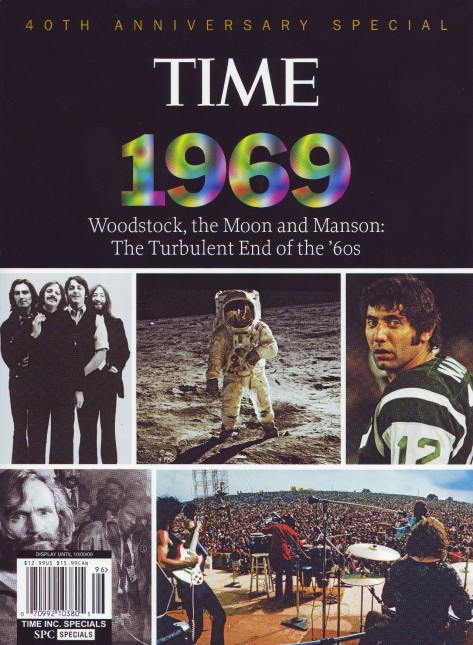1969 was a quite a year!
What are the special events of 1969 that you recall? The accompanying photograph of ‘Time’ magazine’s cover ‘1969’ highlights some of these special events, and the magazine’s articles are a goldmine of information about the year 1969.

At a personal level, a very special event happened for me in 1969. I was doing my final year engineering design project at Melbourne University when a lecturer set up a television set and we watched the first man walk on the moon. Wow! That was extraordinary. It seemed like technology was going to solve the world’s problems. Engineers would rule the world! But that same year, people of my age were being destroyed by that same technology in a war in Vietnam. I came to realise that technology could be used for great good or for great evil.
The following year, I commenced work as a Chemical Engineer in a petrol refinery and I also commenced a degree in Economics and Political Science at Melbourne University. In part, I commenced this second degree because I wanted to better understand the world of politics and economics that so dominated our society’s major decision making; including decisions about technology being used for good or for evil.
Through my studies I became a minor expert in the economic-political ‘isms’: communism, capitalism, socialism, Marxism. But it was clear that none of these ‘isms’ in themselves, actually worked!
In my third and final year, an extraordinary event happened. Dennis, one of my former tutors in economics invited me to do a Bible study on the life of Jesus Christ! Now that, was unusual. It had never happened to me before! But I was curious. I thought, “Well, I’ve studied mathematics, chemistry, physics, engineering, economics and politics. So why not study the life of Jesus?”
Through my study of Jesus Christ I came to realise that he presented the reason why neither technology nor any of the ‘isms’ were the answer to the world’s problems. Jesus said that the reason for the world’s problems was me! And you! All of us have a basic flaw. This flaw disables us from loving one another and caring for this world in the way that we should. Technically, this flaw is called ‘sin’. Jesus said that I was a lost son, a rebel against God, that every person was a rebel against God, and through this rebellion against God the Creator, the world had become chaotic. Jesus through his life, death and resurrection was calling me to return home to him, to be forgiven and reconciled with my Creator.
After some months of wrestling with the life and ministry of Jesus and through many discussions with Dennis, I made the decision to become a follower of Jesus Christ. So it was that one evening I knelt by my bed and asked God to forgive me for my rebellion, for leaving him out of my life and asked him to accept me as his child and to give me the strength to follow Jesus all the days of my life.
- Becoming a follower of Jesus has enabled me to understand who I am:
I am a child of God on a pilgrimage of faith in Christ in the midst of a chaotic world.
- Becoming a follower of Jesus has enabled me to understand where I am:
I am in a chaotic and rebellious world, which is yet loved by God who seeks its rescue.
- Becoming a follower of Jesus has enabled me to understand what I am here for:
to love God and to love my neighbour as myself.
- Becoming a follower of Jesus has enabled me to understand where I am going:
I am going to spend eternal life with Jesus Christ and with all those who love him.
In summary, becoming a follower of Jesus makes sense of the world and has given me identity, purpose and hope.
And I just love talking about it! I’m just a beggar who has found bread, found life, and I want others to know where the bread of life can be found.
May the Holy Spirit empower us to follow Jesus all the days of our life.
*Notes for ‘Witness talk’ at an Ultreya meeting of Cursillo, by Bishop John Harrower, Campbell Town, Tasmania, 10 October 2009


